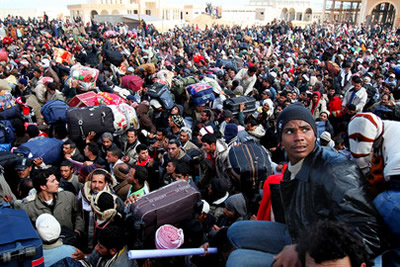International Migrants Day
"Migration is a global issue that is rightly attracting more and more global attention", states Ban Ki-moon, UN Secretary-General.

Every moment, around the world, people leave their countries in search of a safer or better life. Globally, more than 214 million people are on the move. Many flee difficult conditions only to face even greater struggles, including human rights violations, poverty and discrimination. But these migrants have more than fear and uncertainty; they also possess hopes, courage and the resolve to build a better life. With the right support, they can contribute to society's progress.
Migration is a global issue that is rightly attracting more and more global attention. Next year, the United Nations General Assembly will hold its second High-Level Dialogue on International Migration and Development, giving Member States and their partners a chance to discuss practical measures to facilitate labour mobility, foster sustainable development and protect the rights of migrants, especially women and girls.
Attention to the rights of migrants is especially important at this time of global economic and financial distress. As budgets tighten, we are seeing austerity measures that discriminate against migrant workers, xenophobic rhetoric that encourages violence against irregular migrants, and proposed immigration laws that allow the police to profile migrants with impunity. During economic downturns, it is worth remembering that whole sectors of the economy depend on migrant workers and migrant entrepreneurs help to create jobs.
When migration policies are developed without attention to vulnerability, marginalization and discrimination, millions of migrants become cheap, disposable labour, the scapegoats for failed economic and social policies, and even casualties in an ill-defined war against "illegal migration."
As human mobility becomes more complex, and the journeys taken by many migrants more perilous, it becomes all the more urgent to forge national policy responses that address migration based on human rights principles.
In the lead-up to the High-level Dialogue, I hope that Member States will approach human rights as a central issue in migration governance; at the national level I encourage them to take such measures as decriminalizing irregular migration, setting up effective alternatives to immigration detention, and ensuring that the functions of public service providers such as nurses or teachers are kept strictly separate from those of the immigration authorities. I also hope participants will duly consider the issue of migration in the context of the post-2015 global development agenda.
On this International Migrants Day, I call on States to ratify and implement all instruments on this issue. And I encourage all people to help foster a principled, practical and creative discussion on how we can ensure the protection of the rights of all migrants, wherever they are and whatever their status.
Ban Ki-moon
Secretary-General
United Nations